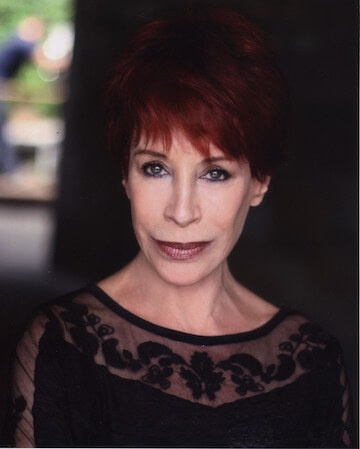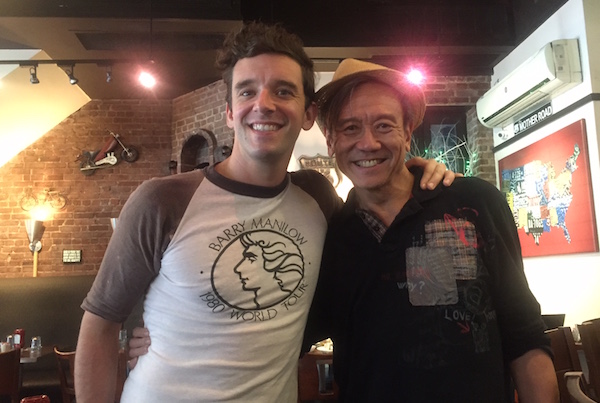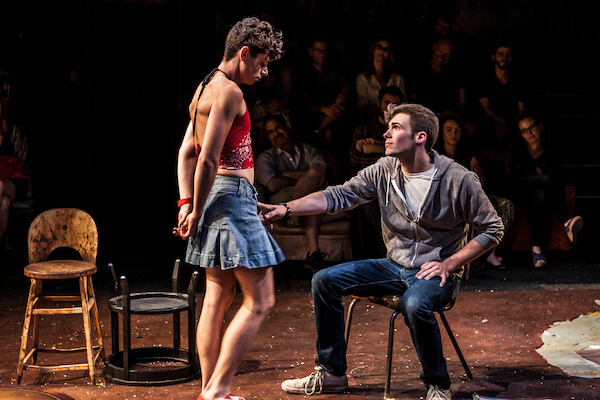Miriam Silverman and Christian Coulson in Sheila Callaghan’s “Everything You Touch,” directed by Jessica Kubzansky. | RATTLESTICK.ORG
I always welcome a truly fresh and talented voice in the theater — they are all too rare, but Sheila Callaghan definitely is one. Her enthralling, ultra-glamorous, but equally deep play “Everything You Touch,” at the Cherry Lane, has at its center a complex, combative mother-daughter tale that takes us from the 1970s to the present (38 Commerce St., btwn. Barrow St. and Seventh Ave. S., through Mar. 29; rattlestick.org). It’s the story of Jess (Miriam Silverman), an overweight, unkempt computer programmer whose worlds-apart-from-her parents are a famous fashion designer, Victor (Christian Coulson), and his very bitter beauty of a muse, Esme (Tonya Glanz). Esme, now dying, set an impossibly high bar for her haplessly hungry daughter to attain.
Callaghan nails the now mythic hedonistic but toxic fashion world of the 1970s with uncanny accuracy, especially considering she was born in ‘73.
“That period felt like a little bit of the Wild West when you could still be a hero,” she told me. “There are so many artists now in the marketplace and it’s accessible now in a way that it wasn’t before, when I felt like there were still very few superstars. It was a fun arena to play in, with high dramatics.”
The other half of the play is set in 2015, where Jess comes across as a sympathetically schlubby Manhattan Everywoman of today.
Sheila Callaghan a playwright for our time; deejay Keith Price mines his stand-up roots
“I feel like she’s sort of like my inner voice,” Callaghan laughed, “the person who is measuring herself up to a standard that she didn’t prescribe for herself, figuring out how she fits in. Having a damaging upbringing of course doesn’t help her being able to identify herself in a world of people she’s not feeling herself a match for, physically or even emotionally. I had a kind of difficult upbringing, and I’m not a size one woman and can’t wear most of what comes off the runway.”
Silverman gives a beautifully empathetic performance as Jess.
“We had some conversations about Jess, because we had several larger women come in,” she said. “They were comfortable with their bodies and had a lack of vulnerability, and that was a beautiful choice and interesting. But Jess didn’t need to be big, she just needed to feel big, and we had padding for that, anyway. Miriam wasn’t a bigger girl, but she had this kind of beautiful vulnerability that suited the character. It was more important that we got the yearning, that longing kind of thing, than it was to get the size.
“Our Victor walked in the door and he was it, immediately,” Callaghan said. “Just the right size, depth, humor. Perfect.”
The character of Victor is a little maddening because when he reappears in Jess’ life, you wonder if he is real or a figment of her imagination, something that bothered a lot of the more clueless critics who used this to totally dismiss the play out of hand.
“Victor — well, I mean Jess needed some sort of moral support before she went on her journey of self,” Callaghan explained. “So he’s a number of different kinds of things incarnated in one entity. He’s as real as he needs to be.
“I’ve never been the kind of person who gets a lot of good reviews across the board. It makes me sad a little bit, but I’m working in a hybrid form — half realism and half fantasy. People want it to be one or another or they just want some very solid ideas they can hang something on. It’s not the vein I like to work in and it’s not what I like to shop the theater for. Everybody’s experience is going to be different, which is sort of what I like about the theater.”
Callaghan excels in her rich expressive dialogue, particularly when her characters are in attack mode (“Your ass is like two trash bags filled with sadness”). The result makes the tired, monotonous, empty vituperation of the overrated film “Whiplash” pale by comparison. The “c word” is flung about and I’d always wanted to ask a female writer about that term, which they constantly use in Britain but still draws politically correct gasps here.
“I think it’s silly when words are given that much power,” Callaghan responded. “I have a six-year-old kid and he’s not allowed to use curse words around the house, mainly because of other people’s reactions. I don’t want him to think words are scary.
“When I was a kid I told my brother to eat me and my mother literally made me swallow a mouthful of soft soap to clean out my mouth. That was really disgusting and horrible and abusive, but what I also felt exciting about it was that there’s actually something in language that would make somebody react so horribly that they were pushed to an absolute limit because of just a couple of words. I don’t know that people are going to walk away from my play saying, ‘She said the ‘c-word.’ I think there are other arch things in the play that they’ll want to take apart. But I don’t know.”
I asked Callaghan about the “difficult” background she had referred to: “I’m from Freehold, New Jersey, and my father owned a bar and was a little or a lot of an alcoholic and my mother had some drinking problems. I was adopted and I still talk to my mom. My dad died when I was in my early 20s, pretty traumatic.
“I grew up in that bar, seeing a lot of things way too young. We lost our house, and I was the only one to be able to graduate college because I was on scholarship. A part of my writing is always about survival. My writing got me out of my house and New Jersey… I always wrote and when I was young, everybody around me kept journals, the girls and sensitive boys writing short stories and poems. That’s what you just did, and some people stopped and I didn’t understand why. This is fun!”
Callaghan has a real writing career now, between her plays and television, where she wrote for “The United States of Tara,” the Showtime series that featured Toni Collette and John Corbett, and is now producer as well as writer of the series “Shameless,” with William H. Macy, also on Showtime.
“I feel lucky,” she said. “It’s a good time for playwrights and TV because there’s a lot more need for good material — complete stories with a complete world — and we have more control of the language. But I’m one of those writers who do TV to continue to do theater, not vice-versa. I’m still a New Yorker, I just live in LA because my job is there. I have a six-year-old kid now and can no longer go around the country, getting all my money from teaching. I can’t afford New York anymore — have been driven out — but spend as much time as I can here while still trying to have a fucking life. When I was in my 20s I could be poor, but I’m not ready to inflict that on my child.”
Keith Price and I at the Hudson Diner. | DAVID NOH
Keith Price, big and bodaciously funny, is not only a welcome, very out presence on Sirius Radio (Out Q, channel 106; Mon.-Fri., 7-11 a.m.), but a terrific live performer, as well. He has a new one-man show, “Ebony Chunky Love: Heartaches and Hard-Ons,” which he performs at the Duplex (61 Christopher St., Sheridan Sq., Mar. 27, 9:30 p.m.; theduplex.com) and other venues. I got him to sit his fierce ass down at the Hudson Diner, and dish he did, giving me the 411 not only about his show but other juicy topics. Margaret Cho and “Noah’s Arc” creator Patrick Ian-Polk, Price said, are pills to interview, and he also offered the opinion that the famous “Grey’s Anatomy” homophobia fracas between Isaiah Washington and T.R. Knight was a bit over-blown — and perhaps a tad deserved, as well.
“This is not cabaret, this is more stand-up/ raconteur,” he said of his one-man. “The first show I did years ago was called ‘Ebony Chunky Love: Bitch Can’t Get a Date,’ and it was about why, being as fabulous as I assumed I was in my 30s, I was single. You do the self-exploration and realize it’s half your parents and half shit you gotta figure out on your own. At some point you can’t be responsible for how people deal with you, but you can be for what you put out there.
“When I started doing that show, that was when I got the job at Sirius and my life went in another direction so I wasn’t able to do as much comedy as I would have liked. I had seen so many other people’s one-man shows, which were all the same thing — about when ‘I came out’ — and I had no intention of going backwards. I was having a convo with a friend, like you and I were just having about our boyfriends — ‘Gurl, he had the nerve, and then he said to me…’ and we were laughing, and that’s when she said to me, ‘Take that out on stage. We know you can tell a joke, do stand-up, but it’s all about getting to know you.’
“This show is called ‘Heartaches and Hard-Ons,” so by now I have processed some of the pain — from my father — and a lot of the trash and in an odd way found new rules to live by, because basically I was a whore. Not every man was bad — there were a few that I wish woulda called again, now that I’m all loved up at this point. But I realized all that foolishness had a point to it, what Oprah says about learning something from every person you meet. I had to figure out what stories to tell — and there were a few to pick from [laughs]. But the question remains: did they ultimately lead me to the person I’m with, or did it just happen that I thought, ‘Well, you’re not too irritating,’ and the next thing you know we’re together six years?”
Price was born in New York, but grew up in Galveston, Texas, part black and part Honduran, “in a very white place where they don’t like black or Latino. The most racist thing ever said to my face was in a gay bar. This guy I was standing nearby looked at the others in his group and said, ‘I don’t care if he hears me. I hate niggers!’ I said, ‘You know you need to be very careful about that because this is Texas, and if there’s one thing they hate more than niggers it’s faggots. Understand this, because if something goes down here, this nigger ain’t gonna be around to help you.” That shut him down, and his friends were so embarrassed, saying, ‘I can’t believe he said that!’”
Price’s landing his Sirius gig was “a classic case of being at the right place at the right time and having a good attitude.” Invited onto Sirius by a straight comedian, who during the segment talked about not liking soap operas, “I made a silly comment, and Deejay Larry Flick heard me and laughed out loud, and then wanted to know who I was. We bonded over Erica Kane… Larry told me to be ready, because he may call me to audition.”
That call came, and Price landed the job.
“The first few months were really hard, because it was not like working in a club,” he recalled. “There were about 50-75 people watching and listening in the Starlight Lounge, and about three to four million people listening in their cars, trucks, offices, and at home. So things one can say in a comedy setting that people will find funny, sometimes did not land the same way in Tulsa.
“I remember making a joke about what would happen if a fire broke out at the children’s hospital [where he’d worked], what would I do? I said, jokingly, ‘Unless you threw those babies at me like a wide receiver, I guess there would be a whole lot of burnt up babies, because I am saving me.’ Now of course, I would never do that, but some idiot with no sense of humor made a call to someone upstairs and just could not believe that anyone would leave a baby to burn up in a building, and who wants to hear that on a gay station. I also dealt with ‘He sounds so gay!’ ‘He sounds too black!’ ‘He’s not black enough!’ ‘He’s not gay enough!’ Luckily, Larry was determined for me to stay and was in my corner. I learned how to not care too much what people say, to stay away from the message boards, and I also had to figure out how far the line is to express myself, without generating too much hate mail. Shit still happens now, but it is few and far between.”
Asked who his best and worst interviews were, Price responded, “One of my all-time favorite guests was Joan Rivers. I idolized her since my teenage years, when I started to really develop my sense of humor. She spoke to me in such a great way. In my show, I make a point of talking about her influence on me and how it truly did save my life. She was a legend and a class act.
“As for the worst guest, we had a gay financial planner come on the show during the mortgage and the AIG madness, and he began the conversation with ‘Gays and their disposable incomes.’ He literally stayed in the studio for about five minutes and was then ceremoniously relieved of his time. We all looked at each other and went, ‘Who the fuck in this room has disposable income?’
“All in all, it has been a great turn that I did not expect to have happen, I have gotten to meet so many personal heroes, celebrities that I have always dreamt of meeting, and actually having a few of their numbers in my phone. I have to pinch myself some days.”
Contact David Noh at Inthenoh@aol.com and check out his blog at http://nohway.wordpress.com.




































